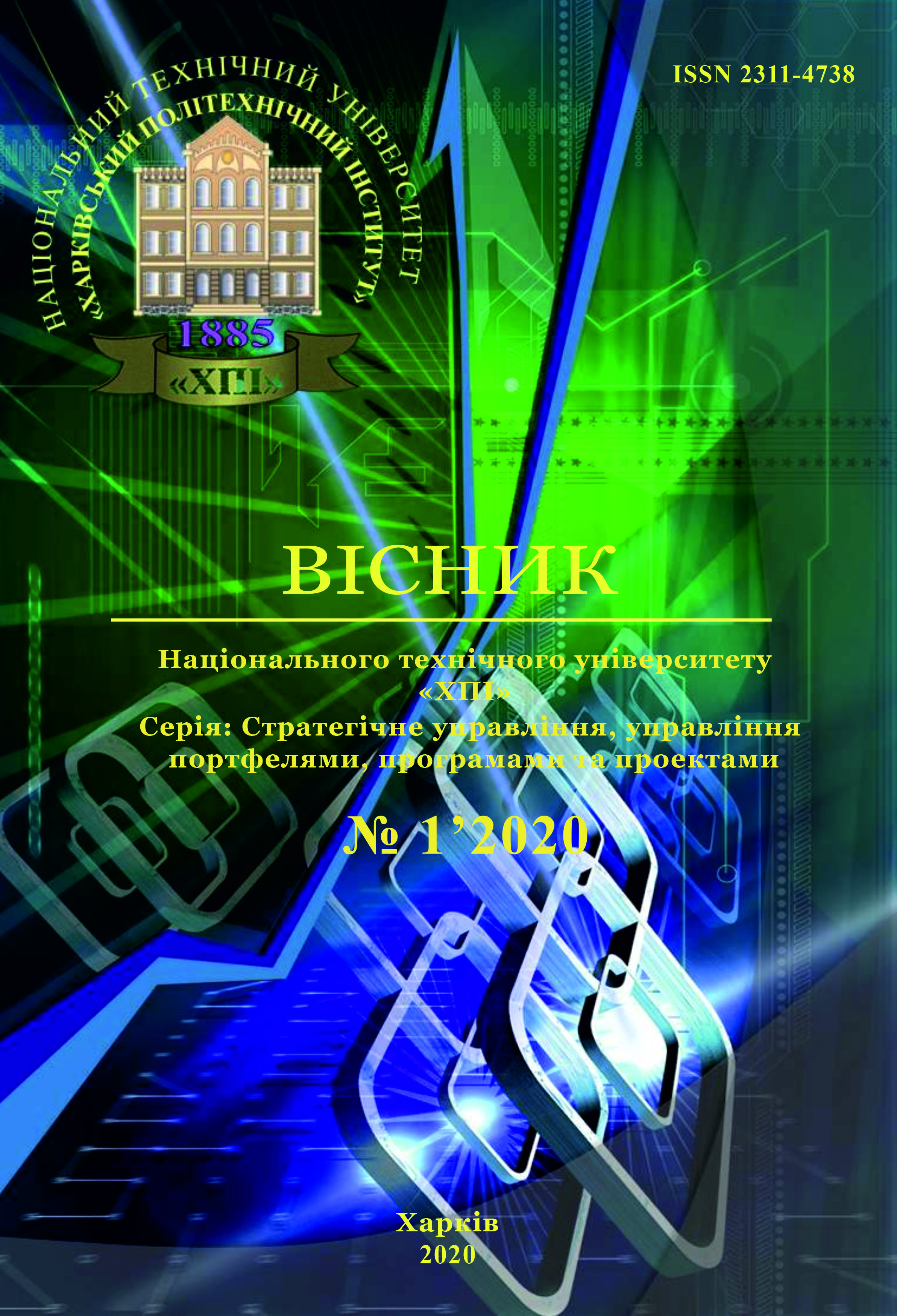METHODOLOGICAL ASPECTS OF CREATING A DIGITAL UNIVERSITY
DOI:
https://doi.org/10.20998/2413-3000.2020.1.4Keywords:
digitization, project management, organizational structure, digital transformation, information technologyAbstract
Discusses the methodological concept of project management of transformation of domestic higher education institutions into digital universities is offered. The conceptual bases of the management of the IHE digitization projects are presented. The concept is based on a single digital space that includes: the digital environment, the tools for its formation, the tools for using the digital environment, the organizational foundations of digital transformation, the methodology of managing digitization projects. It has been shown that the success of the digital transformation of the IHE depends directly on the efficiency of the organization of the management of the digitization projects. This requires the development of a problem-oriented project management methodology. It has been established that none of the existing methodologies is suitable under the terms of IHE digitization projects. Areas of knowledge have been formed from the standpoint of forming and implementing the methodology for the projects of IHE digitization. Namely, change psychology management, implementation management, methodological maturity management, information environment management of IHE digitization projects, impact management. The result of the application of the concept of IHE digitization project management is the formation and implementation of a project management methodology that integrates tools, processes, knowledge of existing project management methodologies with the conditions of IT process implementation in the IHE. The organizational foundations of the digitization of higher education institutions are proposed, on the basis of which a project-oriented organizational structure - the office of digital transformation - is specific for such institutions. The structure and functions of such an office are defined. It is shown that its effective functioning is possible only when applying the management by the projects approach. The processes of higher education institutions from the standpoint of readiness to apply methodologies for managing digitization projects are investigated. Examples of digitization projects of the National Aviation University are given.References
Dooley C. M., Ellison T. L., Welch M. M., Allen M., Bauer D. Digital Participatory Pedagogy: Digital Participation as a Method for Technology Integration in Curriculum. Journal of Digital Learning in Teacher Education. 2016, vol. 32, no. 2, pp. 52-62.
Camilleri M. A., Camilleri A. C. Digital Learning Resources and Ubiquitous Technologies in Education. Tech Know Learn. 2016, pp. 65-82.
Burns M. Success, failure or no significant difference: Charting a course for successfull educational technology integration. International Journal of Emerging Technologies in Learning. 2013, vol. 14, no. 3, pp. 38-45.
EU. Survey of schools: ICT in Education, Digital Agenda for Europe. Publications Office of the European Union, 2013.
Robin B. R. Digital storytelling: A powerful technology tool for the 21st century classroom. Theory in Practice. 2008, vol. 47, no. 3, pp. 220-228.
Unger D. R., Kulhavy D. L., Busch-Petersen K., Hung I.-K. Integrating Faculty Led Service Learning Training to Quantify Height of Natual Resources from a Spacial Science Perspective. International Journal of Higher Education. 2016, vol. 5, no. 3, pp. 104-116.
Isenberg D. J. The tactics of strategic opportunism. Harvard Business Review. 1987, 87 (2), pp. 92‒97.
Digital transformation in higher education. URL: https://www.navitasventures.com/wp-content /uploads/2017/08/HE-Digital-Transformation-_Navitas Ventures_-EN.pdf“The 2018 digital university Staying relevant in the digital age”. Режим доступу: https://www.pwc.co.uk/assets/pdf/the-2018-digital-university-staying-relevant-in-the-digital-age.pdf
The 2018 digital university Staying relevant in the digital age. URL : https://www.pwc.co.uk/assets/pdf/the-2018-digital-university-staying-relevant-in-the-digital-age.pdf.
West D., Gilpin M., Grant T., Anderson A. Water-Scrum-Fall Is The Reality Of Agile For Most Organizations Today. Forrester Research, Inc. 2011.
Mahalakshmi M., Sundararajan M. International Journal of Emerging Technology and Advanced Engineering. 2013, volume 3, Issue 6, pp. 192 – 196.
Satalkar B. Waterfall Model vs. V Mode. URL : http://www.buzzle.com/articles/waterfallmodel-vs-v-model.html
Teslia Yu. N., Khlevna Yu. L. Orhanyzatsyia vnedrenyia konkretyzyrovannoi metodolohyy y ynformatsyonnoi tekhnolohyy upravlenyia proektamy kak edynoi systemy proektno-oryentyrovannoho predpryiatyia [Organization of the introduction of a specific methodology and information technology project management as a unified system of design-oriented enterprise]. Vestnyk NTU «KhPY», Seryia: Novye reshenyia v sovremennykh tekhnolohyiakh [Bulletin of NTU "KhPI", Series: New Solutions in Modern Technologies]. Kharkov: NTU «KhPI». 2018, no. 45 (1321), pp. 134-141. doi:10.20998/2413-4295.2018.45.18.
Teslia I., Yehorchenkov O., Khlevna I., Khlevnyi А. Development concept and method of formation of specific project management methodologies. Eastern European Journal of Advanced Technology. 2018, no. 5/3(95), pp.6 – 16.
Yehorchenkova N. Yu., Yehorchenkov O. V., Khlevna Yu. L., Oberemok N. V. Poproduktova model upravlinnia informatsiinymy resursamy proektno-oriientovanoho pidpryiemstva [Product model of information resources management of a project-oriented enterprise]. Visnyk NTU «KhPI», Seriia:Novi rishennia v suchasnykh tekhnolohiiakh [Bulletin of NTU "KhPI". Series: New solutions in modern technologies]. Kharkiv: NTU «KhPI». 2017, no. 7 (1229), pp. 131-136. doi:10.20998/2413-4295.2017.07.18
Downloads
Published
Issue
Section
License
Copyright (c) 2020 Наталія Юріївна Єгорченкова, Юрій Миколайович Тесля, Юлія Леонідівна Хлевна, Ольга Миколаївна Кичань

This work is licensed under a Creative Commons Attribution-NonCommercial-ShareAlike 4.0 International License.
Our journal abides by the Creative Commons copyright rights and permissions for open access journals.
Authors who publish with this journal agree to the following terms:
Authors hold the copyright without restrictions and grant the journal right of first publication with the work simultaneously licensed under a Creative Commons Attribution-NonCommercial-ShareAlike 4.0 International License (CC BY-NC-SA 4.0) that allows others to share the work with an acknowledgement of the work's authorship and initial publication in this journal.
Authors are able to enter into separate, additional contractual arrangements for the non-commercial and non-exclusive distribution of the journal's published version of the work (e.g., post it to an institutional repository or publish it in a book), with an acknowledgement of its initial publication in this journal.
Authors are permitted and encouraged to post their published work online (e.g., in institutional repositories or on their website) as it can lead to productive exchanges, as well as earlier and greater citation of published work.

